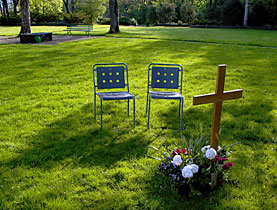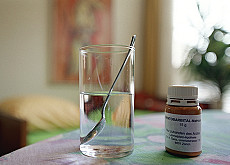Assisted suicide activist speaks out on debate

Two high-profile cases of assisted suicide involving people in Britain have once again revived debate over the right to a dignified death.
Swiss surgeon Jérôme Sobel, president of the Swiss assisted suicide organisation Exit, talks to swissinfo about the realities of assisted death in Switzerland and Europe.
Craig Ewert, a 59-year-old motor neurone disease sufferer from Harrogate, Britain, died in Switzerland in 2006, having been helped by the controversial charity Dignitas. Last week television channel Sky News caused controversy when it showed a documentary of the last moments of the computer science professor’s life.
The film was shown during the same week that a British coroner ruled that Daniel James, 23, a young rugby player who became paralysed from the neck down, intended to end his own life when he visited an assisted-dying clinic in Switzerland earlier this year.
The British Crown Prosecution Service announced it would take no action against James’s parents for helping him. Mark and Julie James faced a maximum sentence of 14 years if they were tried under the Suicide Act.
Direct active euthanasia is taking specific steps to cause the patient’s death, such as injecting the patient with drugs. Indirect active euthanasia is giving the patient a palliative that could lead to death.
Assisted suicide is when a doctor provides a patient with the means to end his own life; however, a doctor does not administer it.
swissinfo: What is the current situation regarding assisted suicide in Switzerland?
Jerôme Sobel: On December 11, 2001 the decision was taken to finally decriminalise assisted suicide. The Penal Code, thanks to the “open” interpretation of one of its articles, allows such assistance, except where there are cases of personal interest.
In other words, we can’t be the patient’s heirs, for example. In Europe, countries including Holland or Belgium have decriminalised active euthanasia under medical supervision.
swissinfo: According to what criteria does Exit agree to assist a suicide candidate?
J.S.: The first thing is that the request for assistance has to be serious and have been made several times.
The person has to be suffering from an incurable disease, which can be predicted to have a fatal outcome. And the illness must also result in mental and physical suffering that makes the person’s life unbearable.
swissinfo: How many patients have been diagnosed as depressed when requesting assisted suicide?
J.S.: That is the fifth basic requirement to be able to have access to our services: capacity for judgement. You can’t have clear judgement when you are depressed.
Requests for assisted suicide are rational. The patient might be sad, but sadness itself is not a symptom of depression.
swissinfo: In Switzerland there are two assisted suicide organisations: Exit and Dignitas. What’s the difference between them?
J.S.: The main difference is that, as revealed by the two cases that occurred last week [Craig Ewert and Daniel James], Dignitas agrees to assist foreign citizens. Also, with Dignitas there is a financial cost for the patient, unlike with Exit.
The members of our association, which has existed since 1982 and involves around 70,000 people, pay an annual fee of SFr30 ($27).
swissinfo: And what are Exit’s conditions?
J.S.: The main one is that we look at requests from Swiss citizens or foreigners who are permanent residents in Switzerland. For one reason: we only have a few assistants and too many requests.
swissinfo: What does an assistant do?
J.S.: They are the ones responsible for following the patient. They are volunteers who study each case, meet the person’s relatives and friends and, when the time comes, provide the patient with the lethal solution.
swissinfo: What happens following a request for assisted suicide?
J.S.: There is a grace period between the request for assisted suicide and the moment it’s actually carried out.
The patient has time to resolve any unsettled matters and say goodbye to family members and friends. Then, from the moment the final date is set, we ask the patient for confirmation that this is indeed their wish.
swissinfo: And what happens next?
J.S.: The patient is given a solution with about ten grams of sodium pentobarbital mixed with a fruit juice that they must be able to drink on their own.
If not, this would be considered euthanasia and not assisted suicide. It’s a subtle but very important nuance.
swissinfo: How well accepted is Exit in Switzerland?
J.S.: According to a recent survey by the French-language 24Heures newspaper, 87 per cent of Swiss citizens agree with the possibility of assisted suicide.
swissinfo: What is the relationship between Exit and religious faith?
J.S.: I would like to tell believers that with assisted suicide there is room for religion, faith and deep spirituality. We have members who are Protestants, Catholics and Jews.
People who think for themselves do not belong to any particular religion. Personally, I am a believer and I believe that God has given me life, but has also given me something more important: a sense of responsibility and the freedom to choose.
swissinfo: Following the cases of Craig Ewert and Daniel James the media has spoken a great deal about euthanasia. Is there a deliberate confusion with assisted suicide?
J.S.: It’s unbelievable how they keep manipulating public opinion with the idea of euthanasia. Apparently people don’t want to understand the enormous difference between euthanasia and assisted suicide. In the latter, only the patient can take the final step to fulfil their own wishes.
swissinfo: What are your hopes for the future?
J.S.: My dream is that we include the concept of death in the curricula of medical schools. I would like family doctors who wish to do so to be able to deal with terminal cases.
I would like Exit to disappear so that suicide assistance is regularised and accepted socially and politically.
I would also like active euthanasia in exceptional cases to be decriminalised.
European society has nothing to fear as no one will force anyone to do anything they don’t want to. But these steps would create a sense of freedom allowing those people who so desire to leave this world with dignity. No more fear would be a huge victory. We would all have something to gain from that.
swissinfo-interview: Rodrigo Carrizo Couto
Switzerland has five assisted suicide organisations which help around 350 people each year.
Exit has 50,000 members and carried out 245 assisted suicides by Swiss or foreign nationals living in Switzerland in 2007.
Dignitas has 5,000 members and helped 195 Swiss and foreigners die in 2006. Dignitas is the only group offering help to non-residents.
It charges up to SFr4,000 for its assistance, said to cover the costs of autopsies and medical examinations
Other organisations, including the larger Exit, only assist Swiss residents and usually go to them in their own homes.
Direct active euthanasia is taking specific steps to cause the patient’s death, such as injecting the patient with drugs. This is usually an overdose of painkillers or sleeping pills.
Indirect active euthanasia is giving the patient a palliative that could lead to death.
Passive euthanasia is usually defined as withdrawing medical treatment with the deliberate intention of causing the patient’s death.
Assisted suicide is when a doctor provides a patient with the means to end his own life; however, a doctor does not administer it.
Switzerland: Assisted suicide and passive euthanasia is legal. Active euthanasia is illegal.
Germany and Italy: Assisted suicide is illegal.
France: Passive euthanasia by doctors or relatives will be legal in future. Active euthanasia remains illegal.
Netherlands and Belgium: permit active euthanasia when a person has made clear that they wish to die.
Britain: has the strictest regulations against assisted suicide in Europe. Many Britons come to Switzerland.
Jérôme Sobel, 55, is a renowned physician specialising in maxillofacial surgery and otolaryngology. His surgery is based in Lausanne.
His commitment to the idea of “dignified death” resulted from the loss of “a very close family member” after a long and painful degenerative disease.
He has been the president of Exit for French-speaking Switzerland since 1982. The association has branches in 23 countries and more than one million members.
Sobel featured in the documentary Exit, the right to die by Swiss-Spanish director Fernand Melgar, which was awarded a Swiss cinema award in 2006.

In compliance with the JTI standards
More: SWI swissinfo.ch certified by the Journalism Trust Initiative












You can find an overview of ongoing debates with our journalists here . Please join us!
If you want to start a conversation about a topic raised in this article or want to report factual errors, email us at english@swissinfo.ch.